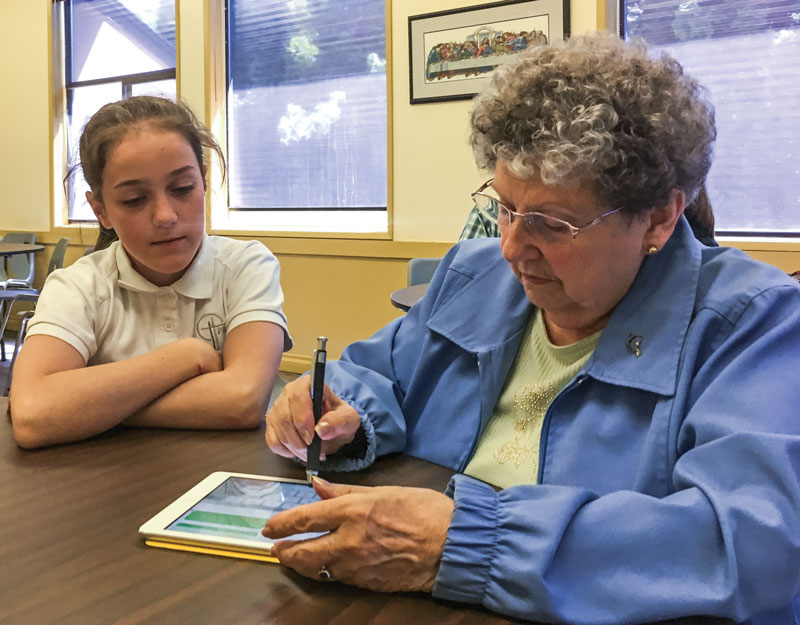Digital devices are a staple of modern life—today, over three-quarters of Canadians have a smartphone, while more than 50 percent use a tablet. These technologies are essential tools, connecting us as never before. But while access to the devices is increasing, one group of Canadians is often left out of the digital loop: seniors.
A new program at the Salvation Army corps in Powell River, B.C., is aiming to change that.
With more than 27 percent of its residents aged 65 and over, Powell River ranks 10th in the country for communities with the oldest populations, and the local corps reflects that trend.
“We have a senior church and we wanted to create a program that would engage and serve them,” says Captain BJ Loder, corps officer.
Focusing on improving seniors’ access to technology was an obvious direction, leading Captain Loder to propose a program that would teach seniors how to use iPads. The corps applied to the British Columbia Division’s strategic initiative fund and was able to purchase 10 tablets.
When the program launched in September 2015, the response was immediately enthusiastic. “I created a sign-up sheet with 10 places on it and 20 people signed up,” says Captain Loder. “Everybody was excited about it.”
June Westgate, 81, has participated since the program began, but admits she was “very reluctant” to sign up. “I don’t have a cellphone and I’ve never had anything to do with computers,” she says.
Eva Bella, 81, had similar misgivings about learning to use an iPad. “I was scared to death of it before we started the program,” she shares. “I was always afraid I’d push a button and something would go wrong.”
Getting access to the technology is one thing; learning how to use it is another. According to a recent Pew Research survey of seniors in the United States, almost half say that when they get a new electronic device, they need someone else to set it up or show them how to use it.
Enter Captain Loder and his team of volunteers. Catering to each participant’s skill level, they walk them through various apps—email, Facebook, YouTube, Google Maps, games and more— answering questions as they go.
“At the beginning, I found the iPad very confusing,” says Westgate. “But as soon as I got an email address, my grandchildren, who live out of town, sent me emails with pictures and videos of my great-grandchildren. It was so exciting.
“My great-grandson is learning to ride a bike and I can watch him doing it,” she adds. “It’s like you’re there!”
Following her success with the program, Westgate now owns her own iPad, a Christmas gift from her family.
As with Westgate, Eva and Andy Bella, 87, were thrilled to be able to communicate and share photos with their daughter and granddaughter, who live in Denmark and Australia. And for Andy, a world traveller himself, the iPad has provided a portal to his past. “I liked learning to use Google Earth because I was a merchant seaman at one time and I can visit everywhere the ship used to call in.”
Along with apps that connect them with the wider world, many participants have appreciated the benefits of using programs that engage their minds in new ways.
“One of my favourite things is games and puzzles because you have to keep thinking ahead,” says Westgate. “It keeps your mind going.”
While the program is aimed at seniors, it reaches across the generations, forming friendships that might otherwise not come to be.
After the first year of the program, Captain Loder recruited a group of children from the Powell River Christian School to help teach the seniors how to use the iPads. “The kids look forward to it every week, and the seniors are excited to work with them,” he says.
“The kids would do it slow for you, and then have you do it,” says Westgate. “They wouldn’t just rush through it; they really helped you.”
“Everybody gets along,” says Andy. “We’re like one big happy family.”
As the program enters its third year, Captain Loder sees opportunities for growth—for example, holding classes at the corps’ recently reopened thrift store. “The excitement and laughter we experience week to week is breathing new life into our corps and community,” he concludes.
A new program at the Salvation Army corps in Powell River, B.C., is aiming to change that.
With more than 27 percent of its residents aged 65 and over, Powell River ranks 10th in the country for communities with the oldest populations, and the local corps reflects that trend.
“We have a senior church and we wanted to create a program that would engage and serve them,” says Captain BJ Loder, corps officer.
Focusing on improving seniors’ access to technology was an obvious direction, leading Captain Loder to propose a program that would teach seniors how to use iPads. The corps applied to the British Columbia Division’s strategic initiative fund and was able to purchase 10 tablets.
When the program launched in September 2015, the response was immediately enthusiastic. “I created a sign-up sheet with 10 places on it and 20 people signed up,” says Captain Loder. “Everybody was excited about it.”
June Westgate, 81, has participated since the program began, but admits she was “very reluctant” to sign up. “I don’t have a cellphone and I’ve never had anything to do with computers,” she says.
Eva Bella, 81, had similar misgivings about learning to use an iPad. “I was scared to death of it before we started the program,” she shares. “I was always afraid I’d push a button and something would go wrong.”
Getting access to the technology is one thing; learning how to use it is another. According to a recent Pew Research survey of seniors in the United States, almost half say that when they get a new electronic device, they need someone else to set it up or show them how to use it.
Enter Captain Loder and his team of volunteers. Catering to each participant’s skill level, they walk them through various apps—email, Facebook, YouTube, Google Maps, games and more— answering questions as they go.
“At the beginning, I found the iPad very confusing,” says Westgate. “But as soon as I got an email address, my grandchildren, who live out of town, sent me emails with pictures and videos of my great-grandchildren. It was so exciting.
“My great-grandson is learning to ride a bike and I can watch him doing it,” she adds. “It’s like you’re there!”
Following her success with the program, Westgate now owns her own iPad, a Christmas gift from her family.
As with Westgate, Eva and Andy Bella, 87, were thrilled to be able to communicate and share photos with their daughter and granddaughter, who live in Denmark and Australia. And for Andy, a world traveller himself, the iPad has provided a portal to his past. “I liked learning to use Google Earth because I was a merchant seaman at one time and I can visit everywhere the ship used to call in.”
Along with apps that connect them with the wider world, many participants have appreciated the benefits of using programs that engage their minds in new ways.
“One of my favourite things is games and puzzles because you have to keep thinking ahead,” says Westgate. “It keeps your mind going.”
While the program is aimed at seniors, it reaches across the generations, forming friendships that might otherwise not come to be.
After the first year of the program, Captain Loder recruited a group of children from the Powell River Christian School to help teach the seniors how to use the iPads. “The kids look forward to it every week, and the seniors are excited to work with them,” he says.
“The kids would do it slow for you, and then have you do it,” says Westgate. “They wouldn’t just rush through it; they really helped you.”
“Everybody gets along,” says Andy. “We’re like one big happy family.”
As the program enters its third year, Captain Loder sees opportunities for growth—for example, holding classes at the corps’ recently reopened thrift store. “The excitement and laughter we experience week to week is breathing new life into our corps and community,” he concludes.










Leave a Comment